9 start with Y start with Y

From Paris to Peking, from Saigon to Washington, the pillars of the postwar world tottered on the brink of collapse in 1968. Year of the Heroic Guerrilla is the first global analysis of that universal upheaval.
Daniels vividly depicts the great crises of that era: the Tet offensive and the abdication of Lyndon Johnson; the denouncement of the counterculture; the fissuring of the civil rights movement and the assassination of Martin Luther King, Jr.; the student revolt at Columbia University; the May uprising in France that nearly overthrew the Fifth Republic; the "cultural revolution" in China; the chilling of the Prague Spring by the Soviet army; and, finally, the convention and riots in Mayor Daley's Chicago, signaling the downturn of the revolutionary spirit in America.
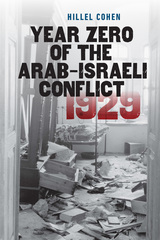
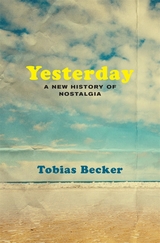
A sweeping reassessment of our longing for the past, from the rise of “retro” to the rhetoric of Brexit and Trump.
Nostalgia has a bad reputation. Its critics dismiss it as mere sentimentality or, worse, a dangerous yearning for an imagined age of purity. And nostalgia is routinely blamed for trivializing the past and obscuring its ugly sides. In Yesterday, Tobias Becker offers a more nuanced and sympathetic view. Surveying the successive waves of nostalgia that swept the United States and Europe after the Second World War, he shows that longing for the past is more complex and sometimes more beneficial than it seems.
The current meaning of “nostalgia” is surprisingly recent: until the 1960s, it usually just meant homesickness, in keeping with the original Greek word. Linking popular culture to postwar politics in the United States, Great Britain, and Germany, Becker explains the shift in meaning. He also responds to arguments against nostalgia, showing its critics as often shortsighted in their own ways as they defend an idea of progress no less naïve than the wistfulness they denounce. All too often, nostalgia itself is criticized, as if its merit did not depend on which specific past one longs for.
Taking its title from one of the most popular songs of all time, and grounded in extensive research, Yesterday offers a rigorous and entertaining perspective on divisive issues in culture and politics. Whether we are revisiting, reviving, reliving, reenacting, or regressing, and whether these activities find expression in politics, music, fashion, or family history, nostalgia is inevitable. It is also powerful, not only serving to define the past but also orienting us toward the future we will create.
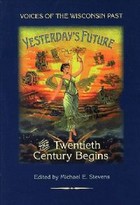
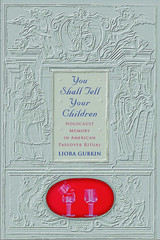
Passover is among the most widely observed holidays for American Jews. During this festival of redemption, Jewish families retell the biblical story of Exodus using a ritual book known as a haggadah, often weaving modern tales of oppression through the biblical narrative. References to the Holocaust are some of the most common additions to contemporary haggadot. However, the parallel between ancient and modern oppression, which seems obvious to some, raises troubling questions for many others. Is it possible to find any redemptive meaning in the Nazi genocide? Are we adding value to this unforgivable moment in history?
Liora Gubkin critiques commemorations that violate memory by erasing the value of everyday life that was lost and collapse the diversity of responses both during the Shoah and afterward. She recounts oral testimonies from Holocaust survivors, cites references to the holiday in popular American culture, and analyzes examples of actual haggadot. Ultimately, Gubkin concludes that it is possible and important to make a space for Holocaust commemoration, all the time recognizing that haggadot must be constantly revisited and “performed.”

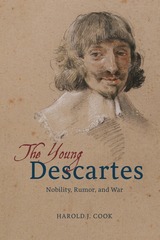
In The Young Descartes, Harold J. Cook tells the story of a man who did not set out to become an author or philosopher—Descartes began publishing only after the age of forty. Rather, for years he traveled throughout Europe in diplomacy and at war. He was present at the opening events of the Thirty Years' War in Central Europe and Northern Italy, and was also later involved in struggles within France. Enduring exile, scandals, and courtly intrigue, on his journeys Descartes associated with many of the most innovative free thinkers and poets of his day, as well as great noblemen, noblewomen, and charismatic religious reformers. In his personal life, he expressed love for men as well as women and was accused of libertinism by his adversaries.
These early years on the move, in touch with powerful people and great events, and his experiences with military engineering and philosophical materialism all shaped the thinker and philosopher Descartes became in exile, where he would begin to write and publish, with purpose. But though it is these writings that made ultimately made him famous, The Young Descartes shows that this story of his early life and the tumultuous times that molded him is sure to spark a reappraisal of his philosophy and legacy.
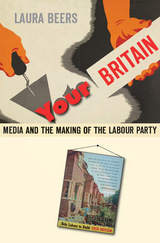
In the early twentieth century, new mass media—popular newspapers, radio, film—exploded at the same time that millions of Britons received the vote in the franchise expansions of 1918 and 1928. The growing centrality of the commercial media to democratic life quickly became evident as organizations of all stripes saw its potential to reach new voters. The new media presented both an exciting opportunity and a significant challenge to the new Labour Party.
Laura Beers traces Labour’s rise as a movement for working-class men to its transformation into a national party that won a landslide victory in 1945. Key to its success was a skillful media strategy designed to win over a broad, diverse coalition of supporters. Though some in the movement harbored reservations about a socialist party making use of the “capitalist” commercial media, others advocated using the media to hammer home the message that Labour represented not only its traditional base but also women, office workers, and professionals. Labour’s national leadership played a pivotal role in the effective use of popular journalism, the BBC, and film to communicate its message to the public. In the process Labour transformed not only its own national profile but also the political process in general.
New Labour’s electoral success of the late twentieth century was due in no small part to its grasp of media communication. This insightful book reminds us that the importance of the mass media to Labour’s political fortunes is by no means a modern phenomenon.
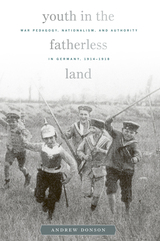
The first comprehensive history of German youth in the First World War, this book investigates the dawn of the great era of mobilizing teenagers and schoolchildren for experiments in state-building and extreme political movements like fascism and communism. It investigates how German teachers could be legendary for their sarcasm and harsh methods but support the world’s most vigorous school reform movement and most extensive network of youth clubs. As a result of the war mobilization, teachers, club leaders, and authors of youth literature instilled militarism and nationalism more deeply into young people than before 1914 but in a way that, paradoxically, relaxed discipline.
In Youth in the Fatherless Land, Andrew Donson details how Germany had far more military youth companies than other nations—as well as the world’s largest Socialist youth organization, which illegally agitated for peace and a proletarian revolution. Mass conscription also empowered female youth, particularly in Germany’s middle-class youth movement, the only one anywhere that fundamentally pitted itself against adults. Donson addresses discourses as well as practices and covers a breadth of topics, including crime, work, sexuality, gender, family, politics, recreation, novels and magazines, social class, and everyday life.
READERS
Browse our collection.
PUBLISHERS
See BiblioVault's publisher services.
STUDENT SERVICES
Files for college accessibility offices.
UChicago Accessibility Resources
home | accessibility | search | about | contact us
BiblioVault ® 2001 - 2024
The University of Chicago Press









